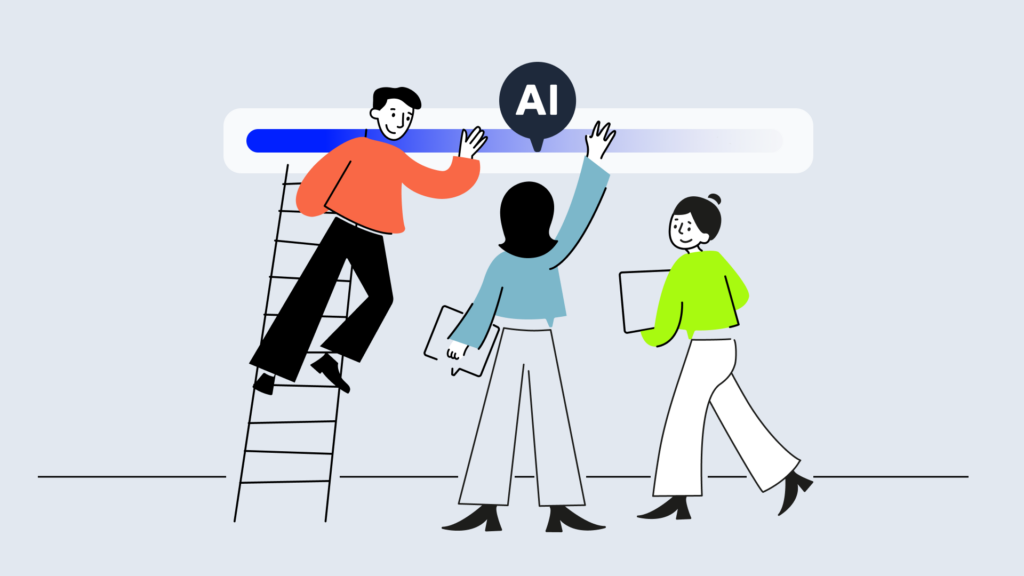
Customer service has evolved drastically. Consumers have gone from having friendly, personal interactions with the local bakers each time they buy something to going online for everything –and not without reason.
Online customer service has become way more personal than ever, and with AI, it’s bound to become even better. In fact, now that 52% of consumers are interested in AI that helps them through a product, website, or feature experience, the market is ready to deliver personalized experiences even at 3 AM. The fledgling AI customer service industry is growing steadily, with 80% of companies either already using or planning to onboard customer service AI tools. This growing interest extends to various AI applications, including the use of an AI agent to enhance customer interactions and streamline support processes.
Now, join us as we explore AI in customer service, providing concrete examples of AI implementation in this field. We’ll also share industry experts’ insights on changing your customer service paradigm to embrace technology.
Key Takeaways:
- AI is revolutionizing customer service by enhancing customer satisfaction and operational efficiency.
- With expert analyses and real-world examples, the article showcases how AI-driven technologies like chatbots and predictive analytics improve customer interactions and processes.
- By choosing the right AI platform, businesses can elevate their customer interactions and make clear, data-driven decisions.
What Is AI in Customer Service?
There’s no doubt artificial Intelligence (AI) is revolutionizing customer service. But it’s not just about automation and generative AI anymore. With the rise of generative AI development services, adding an AI layer to modern customer service platforms unlocks advanced tools to analyze complex data, learn from every interaction, and deliver personalized responses that make customers feel truly valued.
In customer service, AI takes various forms:
- Customer service chatbots that handle routine inquiries with increasing sophistication
- Virtual assistants capable of natural language processing
- Predictive analytics that anticipate customer needs
The impact of these solutions is significant: faster response times, more consistent service quality, and the ability to handle a higher volume of customer interactions. We’re shifting from reactive to proactive customer service as AI continues evolving. Businesses can now predict issues before they arise, offering solutions preemptively.
AI benefits three areas specifically:
- Providing 24/7 availability without human fatigue
- Analyzing vast amounts of data to personalize interactions
- Streamlining workflows for more efficient problem-solving
Start calling with a complimentary virtual phone number for 14 days free!
Key AI Technologies Powering Customer Support
Although there’s a wide variety of AI tools available, AI for customer service primarily focuses on leveraging 4 specific types of tools. These include:
- AI Chatbots & Virtual Assistants: Automate interactions across multiple touchpoints from your website to your helplines with chat and voice agents trained to answer the most common customer questions.
- AI-Powered Call Routing: Optimize agent workloads and prevent burnout by leveraging intelligent call pacing while delivering more relevant service via skill-based routing and Interactive Voice Response (IVR).
- Sentiment Analysis & Customer Insights: Automatically evaluate how your customers feel to escalate issues and save at-risk deals while learning from past interactions and improving future scripts based on behavior.
- Automated Workflows & Ticketing Systems: Speed up issue resolution while saving time on routine tasks by creating custom workflows for ticket creation, contact logging, tracking, and resolution suggestions.
Benefits of AI in Customer Service
As businesses grow, even the most successful and empathetic customer service team can get overwhelmed. But AI can help. Customer support pros report that using AI chatbots to respond to customer service requests saved them an average of 2 hours and 20 minutes per day.
By leveraging the right AI tools, businesses gain the power to deliver almost instant care, providing faster, more personalized responses to customer inquiries.
Let’s discuss some of the biggest benefits AI can provide in customer service.
1. Greater Efficiency
Integrating AI into customer service operations has led to notable efficiency improvements for mid-sized businesses.
By handling routine queries automatically, AI allows human agents to focus on more complex tasks, manage multiple customer interactions simultaneously, minimize delays and result in an 80% decrease in waiting times.
AI helps automate repetitive tasks, such as ticket classification and routine inquiries, allowing your human agents to focus on complex issues. This reduces burnout, improves efficiency, and enhances overall service quality.
2. 24/7 Availability
AI chatbots and virtual assistants help you deliver instant responses, reducing wait times and keeping support available 24/7. This ensures customers get immediate answers without relying on human agents.
AI answering services provide 24/7 support without human fatigue, handling multiple customer interactions simultaneously and ensuring consistent service quality at all hoursuality at all hours.
It also accommodates customers across different time zones, offering seamless assistance whenever needed leading to an 80% decrease in waiting times.
3. Scalability
When customer inquiries surge during peak periods, AI can handle the increased demand. It can manage multiple interactions simultaneously, ensuring no customer is left waiting. This agile approach is a timesaver for sales and support leaders as it gives them more control over their operations.
AI enables businesses to handle high volumes of inquiries without significantly increasing costs. Automated workflows reduce the need for additional agents, making AI a cost-effective solution.
Also, when handling sensitive customer information, many companies can implement LLM red teaming to identify issues in their AI-driven customer service platforms.
AI-powered customer service tools adapt to growing business needs without proportional cost increase, leading to 10% increase in productivity without a substantial cost increase or overhead. This frees the sales team’s hands to tackle business-critical tasks.
4. Reduced Costs
AI-powered integrations can significantly lower operational costs. Companies can allocate reps better, provide specialized support, and deliver a solid customer experience.
AI can also minimize human error, preventing mistakes and optimizing resource allocation based on demand patterns, reducing agent prep time from 60 to 7 seconds. With AI help, a once-overwhelmed customer service team can surmount any obstacle.
5. More Personalized Customer Interactions
AI is able to accurately analyze customer behavior, past interactions, and sentiment to deliver tailored responses and proactive support. This helps you create deeper connections and boost customer satisfaction without much extra effort.
6. Gather Data-Driven Insights
Actionable data provides a solid foundation for strategic planning and business growth. An AI-driven customer support platform will collect and analyze call recordings and tickets to enhance their customer service capabilities.
AI captures and processes customer interactions to identify trends, optimize workflows, and improve service quality. Businesses gain actionable insights that enhance CX and drive operational improvements.
Armed with those insights, companies can make informed decisions that increase customer engagement, turning every interaction into a chance to connect to solve problems with a human touch.
10 Ways to Improve Your Customer Service With AI
Exceptional customer service makes or breaks your business, and AI has become a powerful ally in transforming customer service operations.
But AI takes many forms, and what works for other businesses may not suit yours, so now that we’ve discussed it, let’s talk about ways you can level up your game using AI-powered tools.
- Automate Support With Chatbots and Virtual Assistants: A customer service chatbot manages various queries, offers instant messaging support, and minimizes customer wait times.
Example: Bank of America’s “Erica” virtual assistant provides account insights and financial advice, ensuring customers can access needed information around the clock.
- Predictive Analytics: Predictive analytics anticipate customer needs by analyzing behavior patterns. By examining past interactions and purchase history, AI predicts the next possible customer interaction, allowing proactive issue resolution.
Example: Spotify’s “Discover Weekly” playlist exemplifies AI curating personalized music recommendations based on listening habits.
- Natural Language Processing (NLP): NLP enables AI to comprehend and respond to complex customer queries, enhancing support efficiency. AI interprets detailed questions and offers relevant answers.
Example: Zendesk’s Answer Bot leverages NLP to suggest pertinent help articles, ensuring quick and accurate solutions.
- Automated Email Management: AI technology simplifies managing high volumes of customer emails through automation. It smartly categorizes and prioritizes incoming emails, promptly addressing urgent issues.
Example: Intercom’s operator bot efficiently triages customer emails, streamlining email communication management.
- Visual Recognition: Visual recognition technology elevates customer support by enabling AI to analyze images for troubleshooting and support.
Example: Warby Parker’s virtual glasses try-on feature exemplifies this, aiding customers in making informed decisions without going to the store.
- Voice Analysis: Voice analysis technology adds security and personalization to customer service. AI authenticates customers through voice patterns, ensuring secure account access.
Example: Capital One’s voice ID system offers safe and efficient account access, directing customers to appropriate agents.
- Personalized Recommendations: AI customer service software enhances the shopping experience by delivering recommendations based on browsing and purchase history. Companies tailor suggestions to customer preferences, boosting satisfaction.
Example: Stitch Fix’s AI stylist provides personalized clothing recommendations that align with customer styles and preferences.
- Call Intelligence: Call intelligence uses AI to analyze phone conversations in real time, transcribe calls, identify key issues, and suggest appropriate responses to agents. It also enables sentiment analysis to understand customer emotions and adjust approaches accordingly.
Example: CloudTalk’s call intelligence capabilities assist sales teams by providing detailed interaction analytics, increasing conversion rates.
- AI-Enhanced Knowledge Bases: AI-enhanced knowledge bases provide self-service portals with smart search capabilities, enabling customers to find answers independently. These best knowledge bases continually update with new information based on interactions, maintaining relevant and accurate content.
Example: Salesforce’s Einstein-powered knowledge base offers precise, up-to-date information, reducing the need for direct support and empowering customers to resolve issues on their own.
What to Consider When Implementing AI-powered Customer Service
Implementing AI-powered customer service solutions requires careful consideration to maximize benefits and minimize challenges. Don’t just implement AI to “become cutting-edge,” evaluate your existing IT infrastructure to determine your readiness, and only then dip your toes in the fascinating world of AI-powered tools.
So, before you start, here are five pieces of advice you could follow to guide your journey toward modern customer service.
Keep Your Data In Top Shape
To get the most out of AI, ensure that your data is accurate, comprehensive, and well-organized. High-quality data helps AI make better predictions and enhances customer interactions.
Prioritize Customer Privacy and Security
Protect your customers’ information with robust security measures and comply with GDPR or CCPA regulations. This will build trust and keep you out of legal trouble.
Seamlessly Integrate with Existing Systems
Choose an AI system that seamlessly integrates with your current CRM and other business systems. This smooth integration provides a unified view of customer interactions, making your service more efficient.
Customize and Scale with Ease
Opt for an AI solution tailored to your business’s needs and grow with you. Flexible and scalable AI will keep your teams effective as your business expands.
Foster Human-AI Collaboration
An AI customer support agent should augment the humans in your contact center, not replace them. Train your staff to effectively use AI tools, creating a collaborative environment where AI handles routine tasks and frees human agents to focus on complex issues.
How To Get Started With AI In Customer Service
Stage
What Should You Do?
Why It Matters
Assess Your Needs
Identify specific areas in your customer service that could benefit from AI, focusing on repetitive tasks, call routing, and analyzing customer interactions.
Pinpointing these areas allows you to effectively target which processes AI could really disrupt.
Choose CloudTalk
Utilize CloudTalk’s AI-powered features like real-time call transcription, sentiment analysis, and automatic call summaries to enhance efficiency and service quality.
CloudTalk’s advanced AI features streamline operations and improve the accuracy and quality of customer interactions.
Integrate Seamlessly
Integrate CloudTalk AI with your existing CRM and other business systems to ensure a unified view of customer success for personalized and efficient service.
Seamless integration provides a comprehensive understanding of customer needs and enables consistent, high-quality service.
Train Your Team
Educate your customer service team on using CloudTalk AI tools effectively, highlighting how these tools can assist in daily tasks and improve overall customer satisfaction.
Proper training ensures your team can fully leverage AI tools to enhance their productivity.
Regular monitoring and optimization help keep your AI stack fresh and functional.
Monitor and Optimize
Track the performance of CloudTalk AI tools regularly, gather feedback from your team and customers, and continuously optimize AI settings and processes to meet evolving needs.
Regular monitoring and optimization help keep your AI stack fresh and functional.
Discover even more AI-powered and advanced call center features!
10 Expert Opinions on How AI Improves Customer Service
1. Sanket Shah, CEO at InVideo
What do you see as the biggest benefits of implementing AI in customer service?
As CEO of Invideo, I’m excited to share my thoughts on the biggest benefits of implementing AI in customer service. I think AI has the potential to revolutionize customer service by making it more efficient, accurate, personalized, and cost-effective. As AI continues to develop, we will see even more benefits from its use in customer service.
What are specific examples of AI improving the customer service experience for businesses you work with?
- One of our telco clients reduced the average wait time for customer service calls by 50% by using AI to answer frequently asked questions (FAQs). This freed up agents to focus on the exact customer issue.
- One retail client increased its customer satisfaction score by 10% by using AI to personalize each customer’s shopping experience. The company used AI to track customer behavior and preferences and then used that information to recommend relevant products and services.
- Another financial services client reduced fraud by 20% by utilizing AI to monitor customer transactions for suspicious activity. This remarkable achievement was largely attributed to their algorithms’ ability to detect advanced types of fraud, such as synthetic identity fraud and employment identity fraud.
How can businesses ensure that AI enhances, rather than replaces, the human element of customer service?
- AI augments human capabilities, but it shouldn’t replace them. Use AI to automate repetitive or time-consuming tasks and free up agents’ time to focus on real customer issues.
- Use AI to track customer interactions and identify areas where you can improve customer experience.
- Train agents to use AI efficiently so they help to improve customer experience.
What do you predict for the future of AI in customer service?
I believe that AI’s importance in customer service will continue to grow. As it advances, it can handle increasingly complex customer interactions.
2. Andrei Geist, Off-Page SEO Specialist at Flipsnack
What do you see as the biggest benefits of implementing AI in customer service?
Customer service work can be a slog. Directing customers toward the person at your company who is best qualified to help them solve their issues or provide feedback is often more time-consuming than actually solving the problem.
Pre-programmed chatbots have improved o these pain points to an extent, but they’re far from a fix-all solution. AI customer service chatbots are one of the most obvious and widely utilized customer solutions, as they greatly ease the challenges associated with customer service.
At Flipsnack, excellent customer service is the cornerstone of our corporate identity. Flipsnack works like a charm 99% of the time, but nothing is perfect, and things sometimes slip through the cracks.
What are specific examples of AI improving the customer service experience for businesses you work with?
Off the top of my head, one of the best examples is Revolut’s customer service portal. When multiple banks, currencies, and individuals are involved in transferring money internationally, issues arise sooner or later.
Thankfully, using Revolut’s customer service is super easy. You don’t need to contact a call center; simply open a support ticket in the app, describe your issue, and wait for a customer service reply.
How can businesses ensure that AI enhances, rather than replaces, the human element of customer service?
As I mentioned earlier, customer service has tremendous potential for streamlining customer service center flows. However, many customer service representatives worry that AI will make them obsolete.
This is a valid concern; many companies are already considering replacing their customer service divisions with entirely AI-driven customer service solutions.
Luckily, the human aspect of customer service will not go anywhere soon, at least not at Flipsnack!
3. Sam Molony, Head of Content & SEO at Community Phone
What do you see as the biggest benefits of implementing AI in customer service?
The most significant benefits of implementing AI in customer service include increased efficiency, cost savings, and improved customer experience. AI-powered chatbots can handle repetitive tasks, provide instant responses, and offer personalized recommendations, leading to faster resolution times and higher customer satisfaction.
What are specific examples of AI improving the customer service experience for businesses you work with?
AI has improved the customer service experience for businesses a lot. Features like automated email responses, proactive issue resolution, and personalized product recommendations have changed the game. AI can analyze customer data, identify patterns, and offer relevant solutions, resulting in quicker issue resolution and personalized interactions.
How can businesses ensure that AI enhances, rather than replaces, the human element of customer service?
In my opinion, we need to use AI as a tool to support human agents, not replace them. We could train human agents so they learn about AI to handle only routine tasks, empowering human agents to provide a personalized touch when it’s needed.
What do you predict for the future of AI in customer service?
Further advancements in natural language processing, machine learning, and automation are very likely. AI will become even more sophisticated in understanding customer needs, preferences, and emotions and will be seamlessly integrated into customer service workflows. However, human empathy, creativity, and problem-solving skills will still be invaluable in delivering exceptional customer service.
4. Aswin Surya S, Marketing Associate at Hiver
What do you see as the biggest benefits of implementing AI in customer service?
AI minimizes waiting periods and allows for faster response times. AI bots also help route conversations to agents most suited to resolve specific queries. Plus, they offer relevant suggestions when agents respond to a customer via email or chat, considerably reducing manual work.
What are specific examples of AI improving the customer service experience for businesses you work with?
Chatbots provide quick resolutions and offer 24/7 support. They’ve helped many businesses improve response times and reduce customer service costs.
AI-powered sentiment analysis can automatically analyze customer feedback, such as online reviews or social media posts, to gauge customer sentiment and identify trends.Businesses can utilize predictive analytics to anticipate customer needs and offer proactive support.
How can businesses ensure that AI enhances, rather than replaces, the human element of customer service?
When AI encounters inquiries that require human expertise or emotional support, it should seamlessly transfer the customer conversation to a human agent. This is especially needed during crises like losing a credit card..
What do you predict for the future of AI in customer service?
Here are my 3 main ideas:
- Advanced Personalization: AI may provide highly personalized customer service based on an individual’s history and preferences.
- Seamless Omnichannel Support: AI can ensure even more consistent and uninterrupted service across multiple communication platforms.
- More Complex Problem Solving: Future AI may be capable of handling more complex customer inquiries, freeing reps from highly intricate or sensitive issues.
5. Alicja Olko, Outreach Manager at VoilaNorbert
What do you see as the biggest benefits of implementing AI in customer service?
Improved response times for customer support tickets. With AI answering basic queries, customers don’t have to wait for agents to solve simple problems. Supporting customer service teams by collecting data on customer behavior is also a huge advantage. And this is just the beginning. The AI will have an even bigger role as it advances and will be an even greater ally to customer service reps.
How can businesses ensure that AI enhances, rather than replaces, the human element of customer service?
By making sure that agents have the final say before sending any replies to customers.
Furthermore, AI takes over the no-brainer tasks, giving customer service agents more time to focus on truly challenging inquiries. Those where human intellect is currently irreplaceable
6. Kadi Arula, Content Manager at Cherry Servers
What do you see as the biggest benefits of implementing AI in customer service?
Even though AI in customer service doesn’t work well when the customer is dealing with complex issues, it can have a huge impact when answering simple customer questions.
It can eliminate the need to respond to routine tasks, such as responding to the same query each time. Using AI-powered chatbots helps both sides, and it is a win-win situation.
First, the customer gets a faster response, which leaves customer service providers with more time to focus on more complex issues.
What do you predict for the future of AI in customer service?
The way customer service AI works nowadays can still be frustrating, particularly for customers receiving unhelpful automated chatbot responses. However, as AI becomes more advanced and integrated into our daily lives, it can offer solutions to even more complex customer service issues, freeing up time for customer service teams, creating new innovative opportunities, and helping companies grow.
7. Suraj Nair, Digital Marketing Executive at SocialPilot
What do you predict for the future of AI in customer service?
The two primary uses of AI in customer care are quick responses and personalization. Companies have already started using Chatbots to respond to customer queries quickly. However, the limitation is that they direct customers toward help files.
This drawback can be solved by collecting data and creating automated responses for a specific query. Thus, customer care could handle multiple common questions at once. And with proper data analysis, the answers can even be tailored to a particular customer. Thus, your users receive a 24/7 personalized customer care experience.
How can businesses ensure that AI enhances, rather than replaces, the human element of customer service?
You can’t ignore the importance of AI, that’s for sure. So, what you can do is collaborate with it.
8. Kristina Jakeman, CSM at Keyhole
What do you see as the biggest benefits of implementing AI in customer service?
When implementing AI in customer service, one of the biggest benefits I see is its impact on self-service. AI-powered solutions like chatbots and virtual assistants provide customers with a convenient and efficient way to find help or get answers to their questions without the need for human intervention.
9. Iqra Mustafa, SEO Executive at Crawlbase
What do you see as the biggest benefits of implementing AI in customer service?
One of the biggest benefits of implementing AI in customer service is the ability to provide instant responses to customers, resolving their issues within seconds. This quick and efficient support saves customers time and contributes to their overall satisfaction with the company.
How can businesses ensure that AI enhances, rather than replaces, the human element of customer service?
It’s important to recognize that no AI can fully replace humans in customer service because people are needed to manage AI systems. There are certain issues that AI cannot resolve, but humans can. While AI can enhance work speed, it’s crucial to understand that a human brain is still necessary for many aspects of customer service.
10. Niharika Sharma, Growth Manager at Zonkafeedback
What do you see as the biggest benefits of implementing AI in customer service?
One of the biggest benefits of implementing AI in customer service is the enhanced customer experience it brings. With AI chatbots and virtual assistants, businesses can offer personalized and efficient support. These AI-powered systems are available 24/7, providing instant responses and quick issue resolution.
Another significant advantage is the increased efficiency and productivity that AI brings to customer service operations. When you use AI to automate repetitive and mundane tasks, you free up customer service representatives to focus on more complex and strategic activities.
What are specific examples of AI improving the customer service experience for businesses you work with?
- Chatbots and Virtual Assistants: AI-powered chatbots and virtual assistants are being widely used to handle customer inquiries and provide instant support. These virtual agents can quickly understand customer queries and provide accurate and personalized responses, improving response times and reducing the need for human intervention.
- Voice Recognition and Natural Language Processing: Voice assistants, such as Amazon’s Alexa or Google Assistant, utilize AI technologies like voice recognition and natural language processing to assist customers with voice-based interactions.
How can businesses ensure that AI enhances, rather than replaces, the human element of customer service?
Businesses can implement several strategies to ensure that AI enhances rather than replaces the human element of customer service. First, it is important to define AI’s role clearly. This involves identifying specific tasks or processes where AI can be effectively utilized, such as automating repetitive tasks or providing quick responses to frequently asked questions.
78% Support Professionals Feel AI Automation Enhances Their Efficiency
In this article, we explored the transformative impact of AI on customer service and how to make the most of it, supported by expert insights and real-world examples. But to get this efficiency boost, it’s crucial to thoughtfully implement AI solutions that align with business objectives and ethical standards.
As Hubspot research suggests, support professionals who leverage AI are happier and better at their roles. Happy customer service reps do a better job, and that translates into quantifiable efficiency gains for the business.
Despite all the hype that surrounds AI in customer service, the real-world examples we’ve explored demonstrate that the excitement is justified. From CloudTalk’s 83.3% reduction in call quality analysis times to Delta Air Lines’ 60% improvement in self-service resolutions, AI is delivering measurable results across industries.
CloudTalk AI simplifies call analysis, helping your team with data-driven coaching and proactive interactions, leading to happier clients and more deals. Salespeople can easily identify objections and build relationships, while support agents get quick access to call summaries and tags.
Ready to transform your customer service with AI? Explore CloudTalk’s AI-powered solutions and take the next step towards more efficient, effective, and satisfying customer service.
Sources
- 25 stats about AI in customer experience that show how consumers really feel
- The State of AI in Customer Service [New Data]
Take CloudTalk’s AI capabilities for a spin!

















